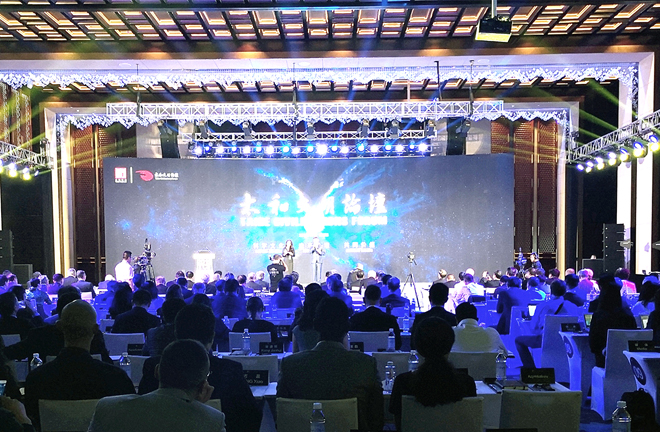Forum calls for international cooperation

The 3rd Taihe Civilizations Forum in Beijing in early September Photo: Lin Yueqin/CSST
At the 3rd Taihe Civilizations Forum in Beijing in early September, more than 300 experts exchanged ideas on cooperation in international relations and the Belt and Road (B&R) initiative, as well as in youth exchanges and the areas of education and culture.
Rashid Alimov, former secretary general of the Shanghai Cooperation Organization, said that international relations are facing a series of new challenges and threats. Confronting and effectively addressing these threats and challenges as well as maintaining normal global governance will lay the foundation for a more rational new international order. This will require cooperation.
Stephen Orlins, president of the National Committee on United States-China Relations, said that US tariff and non-tariff barriers, as well as unfair enforcement and investment restrictions, may benefit some monopoly giants but not serve the interests of the majority. He opposed viewing China as the United States’ strategic competitor. Tackling the threats of climate change, economic crises, pandemics and terrorism requires sincere cooperation between the United States and China. Both sides should work hard to develop better policies.
The world is in a period of historic change, said Robert Daly, director of the Kissinger Institute on China and the United States at the Woodrow Wilson International Center for Scholars. From a strategic perspective, geopolitics, global warming, the dominance over the Arctic, changes in the global value chain, disparity between the rich and the poor, investment risks, cybercrime, immigration and refugees, the spread of large-scale infectious diseases, and the spread of organized crime are all threats. Addressing these changes and challenges requires the United States and China cooperating rather than treating each other as competitors. Only by affirming the position, seeking common ground while preserving differences, and finding areas of cooperation can the relationship be normalized. The two countries can seek cooperation in arms control, climate change, cybersecurity, medical security and consumer product safety.
To enhance the United States’ understanding of the B&R, Orens suggested that China get the US more involved by attracting more American companies and institutions to participate in B&R construction, so that the role and interests of the United States can be more deeply integrated with the B&R, thus gradually easing the United States’ doubt and resistance.
Djoomart Otorbaev, former prime minister of Kyrgyzstan, said that as the infrastructure of the B&R continues to advance, it is increasingly urgent for Chinese culture and ideas to be integrated overseas. However, due to the different cultures and social environments of different countries, China’s communication methods and business models are sometimes misunderstood when investing abroad. As such, Chinese companies investing overseas need to pay more attention to cultural exchanges, better understand local culture, establish dialogue mechanisms, and interact effectively with local people.
Zlatko Lagumdžija, former prime minister of Bosnia and Herzegovina, said that it is necessary to obtain the support of local societies for the implementation and success of the B&R. In the past few years, the B&R has focused on infrastructure construction and accomplished much. In the future, it is necessary to pay more attention to soft power, so as to enhance the understanding, acceptance and support of the B&R initiative in countries along the route.
Ismail Serageldin, co-chair of the Nizami Ganjavi International Center, argued that the increasing popularity of scientific culture affects how people use evidence and reason to resolve disputes. This scientific culture is an important foundation for recognizing people’s common humanity and advancing shared values. It is also a sobering agent for the emotional nationalism incited by populist politicians in many countries today. It strengthens the multilateral system and enables us to adapt to new changes within the framework of international laws and regulations. As such, there is a need to redefine the boundaries of and ethical codes for future technological developments.
Youth represents the future, and the development and cooperation prospects of the world depend on youth exchanges. Jan Fischer, former prime minister of the Czech Republic, called on young people around the world to work hard to establish bridges and ties for international exchanges, including social ties and cultural ties, to promote world civilization and security.
edited by JIANG HONG

 PRINT
PRINT CLOSE
CLOSE